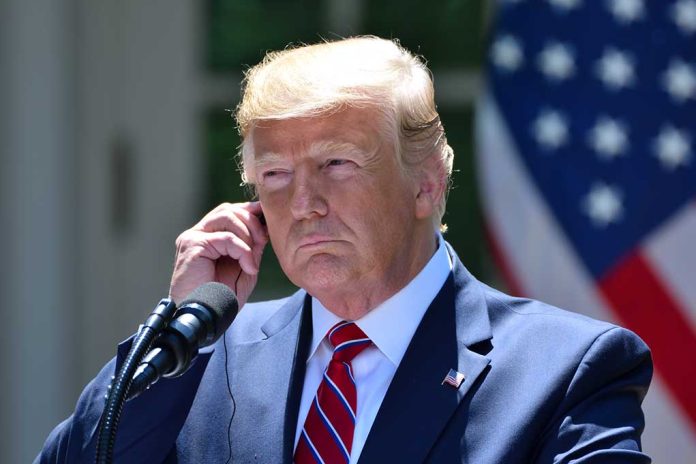🔴 Website 👉 https://u-s-news.com/
Telegram 👉 https://t.me/usnewscom_channel
President Zelenskyy pleads with President Trump to hit Russia with “strong new sanctions” as Moscow refuses to even consider a meaningful ceasefire in Ukraine, showing Putin’s reluctance toward genuine peace negotiations.
Key Takeaways
- President Zelenskyy called on President Trump to impose “strong new sanctions” if peace talks in Istanbul fail to produce results
- Russia has rejected Ukraine’s proposed 30-day ceasefire, offering only a “game of rhetoric” with a minimal 2-3 day partial pause in fighting
- Zelenskyy specifically wants sanctions targeting Russian energy, oil tankers, banks, and the financial sector
- President Trump is withholding new sanctions temporarily while assessing Putin’s seriousness about ending the war
- Upcoming talks in Istanbul face significant challenges as Russia continues making maximalist demands and insists Ukraine halt Western military support
Zelenskyy Demands Stronger Economic Pressure on Russia
Ukrainian President Volodymyr Zelenskyy has directly appealed to President Donald Trump to implement tougher sanctions against Russia if the upcoming peace negotiations in Istanbul fail to produce meaningful results. During a summit of the Bucharest Nine and Nordic leaders in Vilnius, Zelenskyy emphasized that Russia’s unwillingness to consider even temporary cessations of hostilities demonstrates the need for stronger economic consequences. The Ukrainian leader specifically called for sanctions targeting Russia’s energy sector, oil tankers, banking system, and broader financial institutions to force Moscow into genuine peace talks.
“If the Istanbul meeting brings nothing, that clearly means strong new sanctions are urgently needed — from the EU’s 18th package, and from the United States specifically, the strongest sanctions President Trump promised,” said President Volodymyr Zelenskyy.
The Ukrainian delegation plans to propose a 30-day ceasefire and the return of deported Ukrainian children during the Istanbul talks. However, Russia has thus far declined this proposal, instead offering what Zelenskyy described as a “game of rhetoric” with only a two or three-day partial ceasefire. This stark difference in positions highlights the significant challenges facing the negotiation process and explains Zelenskyy’s push for Trump to prepare stronger economic measures as leverage.
Trump’s Calculated Approach to Russian Sanctions
President Trump has indicated that while he is prepared to impose substantial sanctions if necessary, he is first assessing Russian President Vladimir Putin’s seriousness about ending the conflict. The administration is being strategic about the timing of any new economic measures, hoping that the potential for peace may still exist. This approach demonstrates Trump’s commitment to using American economic power as leverage while exploring diplomatic solutions first.
“If I think I’m close to getting a deal, I don’t want to screw it up by doing that,” stated President Donald Trump.
The administration’s cautious approach comes as Russian and Ukrainian delegations prepare to meet in Istanbul. However, Russia has yet to submit a formal memorandum for the talks and continues to demand that Ukraine halt all Western military support. These maximalist demands from Moscow have left many observers skeptical about the possibility of a breakthrough during the upcoming negotiations, potentially making Trump’s sanctions decision all the more crucial in the weeks ahead.
NATO’s Role and Regional Security Concerns
During the summit in Vilnius, Zelenskyy also addressed broader security concerns regarding NATO’s stance and Russia’s attempts to influence the alliance’s decisions. He firmly rejected the notion that Russia should have any veto power over NATO’s enlargement or strategic choices. This position reflects Ukraine’s broader goal of maintaining sovereignty over its foreign policy decisions while securing strong international backing against Russian aggression.
“One of the key principles of European security is that Russia must not have veto power over NATO decisions or influence over the allies or its members,” emphasized President Volodymyr Zelenskyy.
The upcoming NATO summit is expected to deliver a message of strength and unity in the face of ongoing Russian aggression. Zelenskyy expressed gratitude for the transatlantic alliance’s support while emphasizing the critical importance of continued U.S. backing under President Trump’s leadership. This multilateral approach to security, combined with the potential for stronger American sanctions, represents Ukraine’s two-pronged strategy for bringing Russia to meaningful peace negotiations rather than the limited and ineffective partial measures Moscow has offered so far.

